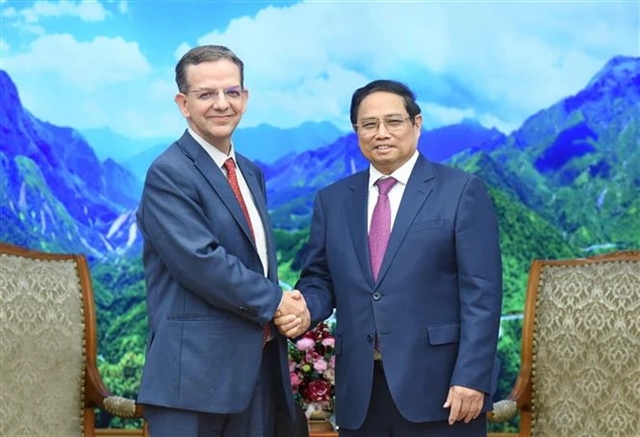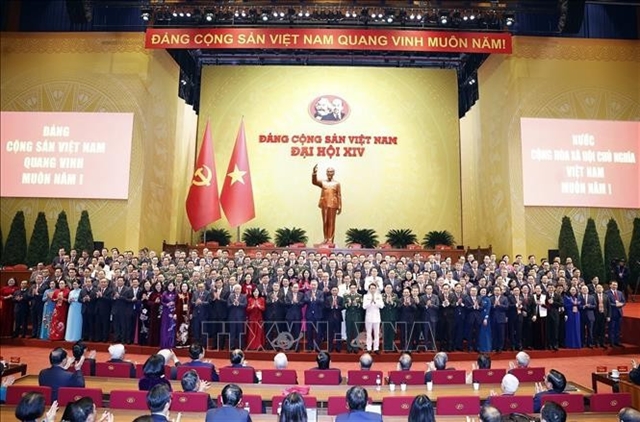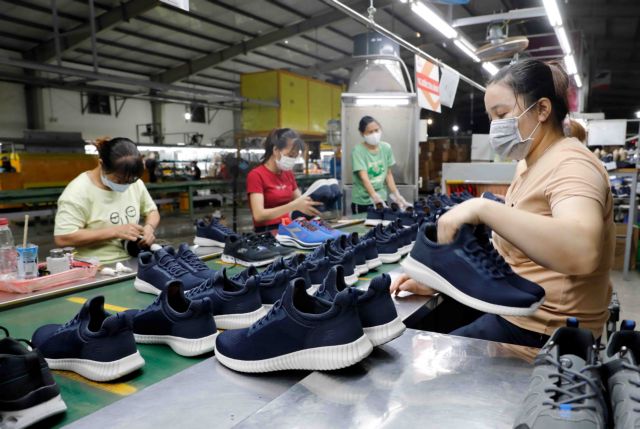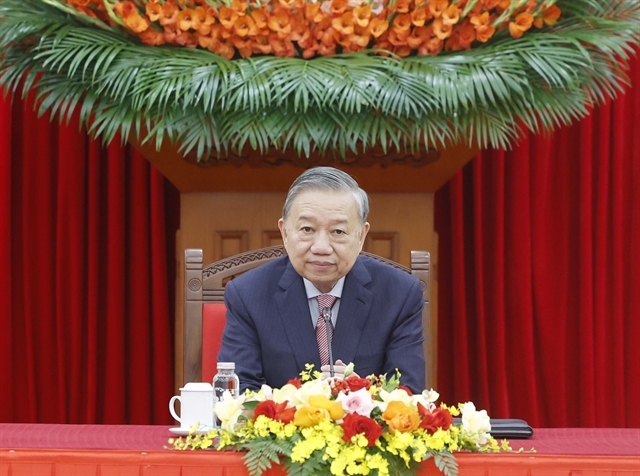 Economy
Economy

 |
| A shoe processing line for exports at Hồng An Company in the northern province of Hòa Bình. The BCI score surged from 46.3 in Q4 2023 to 61.8 in Q4 2024, marking a pivotal shift from a neutral to a positive sentiment in both current and future outlooks. VNA/VNS Photo Trần Việt |
HÀ NỘI — The Business Confidence Index (BCI) of European businesses in Việt Nam in the last quarter of 2024 reached its highest level since early 2022.
The European Chamber of Commerce in Vietnam (EuroCham Vietnam) has released its Q4 2024 BCI report, revealing a significant rise in business sentiment that reflects resilience amid a turbulent global landscape in terms of economics, environment and geopolitics. The BCI score surged from 46.3 in Q4 2023 to 61.8 in Q4 2024, marking a pivotal shift from neutral to positive sentiment in both current and future outlooks. This surge comes despite ongoing operational hurdles and global economic uncertainties.
Việt Nam’s strong performance is partly attributed to the country’s continued growth trajectory, improving infrastructure and emergence as a regional hub for both trade and investment.
EuroCham’s BCI, based on surveys conducted by Decision Lab, serves as an important tool for gauging the sentiment of European businesses in Việt Nam, providing valuable insights into the challenges and opportunities faced in the country’s dynamic market.
For much of the past two years, the BCI hovered around the neutral midpoint of 50, dipping below it on occasion. The Q4 2024 report, however, marks a pivotal shift, as the score reached its highest level since early 2022. According to the survey, 42 per cent of respondents reported feeling positive about the current business situation, with 47 per cent anticipating similarly optimistic conditions for the upcoming quarter. More prominently, 56 per cent of respondents foresee improvements in Việt Nam’s macroeconomic outlook in the first quarter of 2025.
“This is a clear sign that European businesses are increasingly confident about Việt Nam’s economic future,” said Bruno Jaspaert, Chairman of EuroCham Vietnam. “This clear rise in sentiment reflects a broader recognition of the country’s ongoing political and economic transformation over the past year(s). The country’s GDP growth confirms its position as a central player in Southeast Asian regional trade and investment.”
The uptick in business confidence can be attributed to several factors, most notably Việt Nam’s ongoing economic reforms and its centrality in the global shift toward sustainability. Notably, many respondents refered the “double transformation” of digital and green transitions as key drivers of optimism. Businesses that have embraced these trends reported significant growth, with some even citing a 40 per cent increase in revenue compared to the previous year. The trend toward sustainability, spurred by both Government policy and global pressures, is becoming a significant factor in shaping business strategies across multiple sectors.
Perhaps most notably, 75 per cent of survey respondents indicated they would recommend Việt Nam as an investment destination. This data underscores the growing recognition of Việt Nam’s strategic importance as an investment hub within Southeast Asia. With its strong growth rates and expanding infrastructure, Việt Nam has positioned itself as an attractive destination for European businesses looking to expand in the region.
“The growing confidence in Việt Nam as an investment destination is a testament to the country’s solid foundations in both trade and economic policy,” said EuroCham’s chairman. “Despite the global challenges, Việt Nam’s positive investment climate is creating new opportunities for European companies, especially in key sectors like technology, manufacturing, tourism and renewable energy.”
"The data clearly shows that European businesses in Việt Nam are increasingly optimistic about the country’s potential as an investment destination," said Thue Quist Thomasen, CEO of Decision Lab.
“A significant portion of businesses indicated plans to expand their operations in Việt Nam. Approximately one out of four member companies is considering partnerships with Vietnamese suppliers or service providers, and more than one-fifth of the respondents are looking to expand their footprint in the country. Another 30 per cent are looking to increase their import/export operations and/or shift production to Việt Nam. This move aligns with Việt Nam’s successful geopolitical positioning amid global trade shifts, particularly in light of recent disruptions to global supply chains.”
While the overall sentiment is positive, operational challenges continue to be a significant concern for European businesses in Việt Nam. As in previous surveys, the top three operational obstacles identified were administrative burdens, unclear regulations and difficulties in obtaining licences and permits.
The complexities of visa requirements for foreign workers and experts topped the list of administrative challenges, with 42 per cent of responses highlighting this as a primary concern. Tax-related issues, including VAT refunds, were also cited by 30 per cent of respondents, with further challenges related to import/export and investment registration procedures.
“Việt Nam is at a critical juncture,” said Jaspaert. “These ongoing administrative hurdles challenge business operations, but we are optimistic about the government’s determination to create a more conducive environment. Initiatives such as the steering committee for government restructuring show promise. At EuroCham, we strive to contribute best practices and counselling to de-bottleneck the current issues. Our annual WhiteBook will focus specifically on these matters and offer implementations to overcome them.”
As the global economic and political landscape continues to evolve, Việt Nam’s position as a key player in Southeast Asia is becoming increasingly clear. Despite global uncertainties, including fears of further inflation, political instability and the ongoing tensions affecting supply chains, Việt Nam’s economy has remained resilient. —VNS




